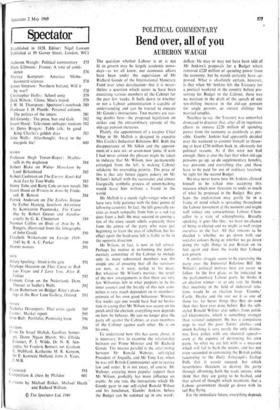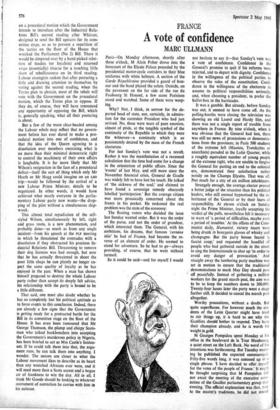Bend over, all of you
POLITICAL COMMENTARY AUBERON WAUGH
The question whether, Labour is or is not fit to govern may be largely academic nowa- days—as we all know, our economic affairs have been under the supervision of Mr Richard Goode of the International Monetary Fund ever since devaluation—but it is never- -theless a question which seems to have been exercising various members of the Cabinet for
the past few weeks. It boils down to whether or not a Labour administration is capable of understanding and can be trusted to execute Mr Goode's instructions.-Two matters are rais- ing doubts here—the proposed legislation on strikes and the extraordinary episode of the old-age pension increases.
Plainly, the appointment of a tougher Chief Whip in Mr Mellish is designed to expedite- Mrs Castle's Industrial Relations Bill. Both the disappearance of Mr Silkin and the appoint- ment of a new six- or seven-man 'junta' (I wish I had never coined the phrase) might be taken to indicate that Mr Wilson, now permanently estranged from the left, is making Cabinet solidarity his overriding priority. The price of this is that any future- jiggery pokery on Mr Wilson's behalf with the sacrosanct and almost liturgically symbolic process of union-bashing would leave him without a friend in the world.
Mr Mellish is a sturdy right-winger who will have very little patience with the finer points of left-wing casuistry. In fact, the left generally ex- cites as much sympathy from him as a red rag does from a bull. He may succeed in cowing a few of the more recent rebels, especially those from the centre of the party who were just beginning to learn the joys of rebellion. but his effect upon the hard-core left is liable to be in the opposite direction.
Mr Wilson, in fact, is now in full retreat. Perhaps his motive in re-forming the parlia- mentary committee of the Cabinet to include only its more substantial members was the simple one of ensuring that all the survivors are now, as it were, nailed to his mast.
But whatever Mr Wilson's motives, the result of the new arrangements is that 'there are very few Wilsonites left in what purports to be his inner council and the loyalty of this new com- mittee is very much dependent on its members' estimate of his own good behaviour. Whereas five weeks ago one would have had no hesita- tion in saying that Mr Wilson was secure on his perch until the election, everything now depends on how he behaves. He can no longer play the party off against the Cabinet, or even members of the Cabinet against each other. He is on his own.
To understand how this has come about, it is necessary first to examine the relationship between our Prime Minister and Mr Richard Goode. The nearest parallel is the relat;onship between Mr Ronald Webster, self-styled President of Anguilla, and Mr Tony Lee, when he was still British Commissioner sent to restore law and order. It is not exact, of course. Mr Webster, enjoying more popular support than Mr Wilson, probably has more influence on events. At any rate, the instructions which Mr Goode gave to our self-styled Ronald Wilson and his henchman, `Gumbs' Jenkins, before the Budget can be summed up in one word: deflate. He may or may not have been told of Mr Jenkins's proposals for a Budget which removed £220 million of spending power from the economy, but he would certainly have ap- proved. What is absolutely certain, however, is that when Mr Jenkins left the Treasury for a poetical weekend in the country before pre- senting his Budget to the Cabinet, there was no mention in the draft of the speech of any ten-shilling increase in the old-age pension for single persons, or sixteen shillings for married couples.
Needless to say, the Treasury was somewhat dismayed to discover that, after all its ingenious efforts to remove £220 million of spending power from the economy as painlessly as pos- sible, 'Gumbs' Jenkins had apparently decided over the weekend to commit himself to throw- ing at least £250 million back in, obviously for political reasons. As if this were not bad enough. there is also the fact that wben old-age pensions go up, so do supplementary benefits, war pensions and everything else, and these have to be paid for out of ordinary taxation. Sit tight for the second Budget.
We may never know how Mr Jenkins allowed himself to be talked into accepting this measure which now threatens to undo so much of what he proposed in the Budget. But per- haps the explanation may partly lie in a frame of mind which is spreading throughout the Labour movement at the moment and might well reduce any conscientious Labour Chan- cellor to a state of schizophrenia. Broadly speaking, it goes like this : we have no chance of being re-elected and we might as well resign ourselves to the fact. All that remains to be decided is whether we go down with our socialist colours flying or whether we go down doing the right things to put Britain on its feet again and show the world that Labour can govern.
A similar struggle seems to be exercising the party over the Industrial Relations Bill. Mr Wilson's political motives here are easier to follow. In the first place, as he indicated to the parliamentary Labour party, he thinks it an election winner—or at any rate. he thinks that inactivity in the field of industrial rela- tions would be an election loser. 'Gumbs,' Castle, Healey and the rest see it as one of those far, far better things that they do now than they have ever done before. But the self- styled Ronald Wilster also suffers from politi- cal kleptomania, which is something stronger than rational judgment. He has a compulsive urge to steal the poor Tories' clothes—and union bashing is very nearly the only distinc- tive Tory policy with any electoral appeal— even at the expense of destroying his own party. So what we are left with is a measure which will fail to bash the unions, and has not even succeeded in convincing the British public (according to the Daily Telegraph's Gallup Poll) that it would succeed, but which nevertheless threatens to destroy the party through affronting both the trade unions, who think that they are going to be bashed, and that school of thought which maintains that. a Labour government should go down with its red flag flying.
For the immediate future, everything depends on a procedural motion which the Government intends to introduce after the Industrial Rela- tions Bill's second reading after Whitsun, designed to send the Bill upstairs for its com- mittee stage, so as to prevent a repetition of the tactics on the floor of the House that wrecked the Parliament (No 2) Bill. There it would be simpered over by a hand-picked selec- tion of toadies (or loyalists) and returned virgo (essentially) intacta for a touching little show of rebelliousness on its third reading. Labour strategists reckon that after posturing a little and drawing attention to themselves by voting against the second reading, when the Tories plan to abstain, most of the rebels will vote with the Government on the procedural motion, which the Tories plan to oppose. If they do, of course, they will have renounced any opportunity of opposing the Bill, which is, generally speaking, what all their posturing is about.
But a few of the more clear-headed among the Labour rebels may reflect that no govern- ment before has ever dared to make a pro- cedural motion into one of confidence, and that the idea of the Queen agreeing to a dissolution over members exercising what is no more than their minimal democratic right to control the machinery of their own affairs is laughable. It is far more likely that Mr Wilson's resignation in the face of a procedural defeat—itself the sort of thing which only Mr Heath or Mr Hogg could imagine on an LSD trip—would be followed by the arrival of a new Labour Prime Minister, details to be negotiated. In other words, it would have achieved what nearly everyone in the parlia- mentary Labour party now wants—the drop- ping of the pilot without a simultaneous ship- wreck.
This almost total repudiation of the self- styled Wilson, simultaneously by left, right and grass roots, is a new phenomenon, and probably dates—as much as from any single incident—from his speech at the Pus meeting in which he threatened the comrades with a dissolution if they obstructed his precious In- dustrial Relations Bill. Threatening to remove their dog licences was bad enough, but now that he has actually threatened to shoot the poor little chaps he can plainly no longer ex- pect the same quality of loyalty as he has enjoyed in the past. When a man has shown himself prepared to destroy the whole Labour party rather than accept its deeply felt advice, his relationship with the party is bound to be a little different.
That said, one must also doubt whether he has so completely lost his political aptitude as to force events to this conclusion. Indeed, there are already a few signs that the Government is getting ready for a protracted battle for the Bill in its committee stage on the floor of the House. It has even been rumoured that Mr George Thomson, the plump and chirpy Scots- man who talked backbenchers into accepting the Government's murderous policy in Nigeria, has been briefed to act as Mrs Castle's lieuten- ant. If he could talk them into that, the argu- ment runs, he can talk them into anything. I wonder. The unions are closer to what the Labour movement likes to describe as its heart than any wretched Africans ever were, and it will need more than a Scots accent and a bogus air of frankness to win the day. All in all, I think Mr Goode should be looking to whatever instrument of correction he carries with him in his suitcase.



































 Previous page
Previous page